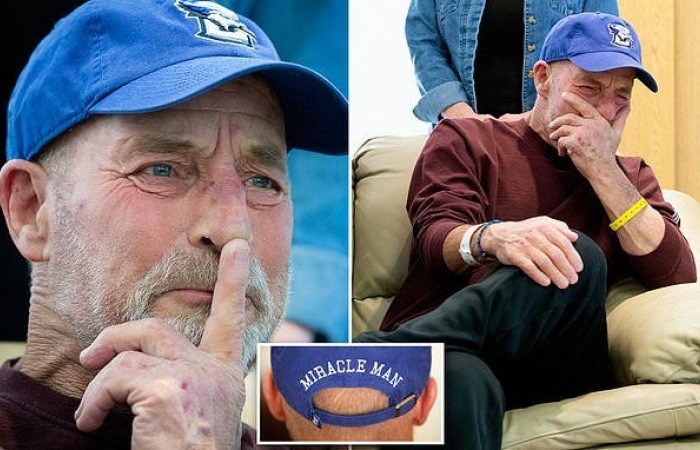A man whose children had decided to remove his breathing tubes has recovered and left an Omaha hospital after weeks of therapy.
Now his family members call T. Scott Marr — once nearly brain-dead — the “miracle man.”
Marr originally was diagnosed with a stroke on Dec. 12 after he was found lying in his bed, unresponsive but breathing. He was rushed to Methodist Hospital and soon placed on a breathing machine in intensive care.
Marr showed no neurological improvement by the time his family returned the following day. Brain swelling — primarily in the back of the brain — concerned his doctors.
“We were worried in this case that this was not a reversible process and that it was going to proceed to brain death,” said Dr. Rebecca Runge.
His daughter Preston Marr said she and the rest of the family faced a harsh reality: Scott Marr was not expected to recover.
“He had always said, ‘I never want you guys to see me lying in a hospital bed, lying in a nursing home,’” Preston Marr said.
“They told us he was on his way to brain death, so we said our goodbyes before extubating him, all the monitors were shut off and we waited by his side,” she said.
He kept breathing. He was still breathing on his own the next morning when his children returned after skipping their appointment with a funeral home.
“I asked him to move his thumbs, and he slowly moved his thumbs, and I asked him to wiggle his toes, and he wiggled all his toes really slightly,” Preston Marr said.
His doctors soon ordered another test. It showed that Scott Marr was suffering from a rare condition called posterior reversible encephalopathy syndrome.
“It’s commonly caused by high blood pressure, but there are many things that can cause it,” Dr. Runge said. The severe swelling Marr experienced is not typical of the syndrome, she said, which is why a devastating stroke was the initial diagnosis.
Marr credits his faith for his survival.
I don’t want to make this into a huge religious thing but I’ll tell you what: It was pretty much a miracle,” he said.
(AP)












6 Responses
If he had died, maybe someone should have been charged with murder.
I hope the frum community learns a little from this. We are so quick to accept that a patient “wants to die”. While BH aborting babies is not ramant in our community like by the secular, we aare still guilty of aborting the elderly who are ill, even terminally. Life is precious, all of life is. Even horribly suffering and debilitating life is from Hashem and to remove a second of it is an irreversible avairah chalila. My father (who has since passed away) live 6 yeasr after we were ready to sign a DNR.
Tragidy is real, emotional pain is too but please at least consider talking to Chayim Aruchim before ever signing a DNR.
Just my (hopefully) humble opinion.
Not to disprove any miracles or rain on any parade – but to me it sounded like a mis-diagnosis. Meaning that in reality, he was never actually nearly brain-dead or anything like that, he just looked that way.
Maybe it was the doctors who were brain dead.
this has no relevance to the current debate about the halakhic validity of brain death. currently, unlike years ago, we can say with 100% certainty, that an individual will never recover even slightly and without a respirator will not be able to breathe. hence, poskim now have an entirely new situation than years ago in the times of RSZA ztl.
Dr. Yidd, to quote an NIH scientific abstract of Aug. 2016 “The ‘brain death’ standard as a criterion of death is closely associated with the need for transplantable organs from heart-beating donors.”
He also states, “Among the many narrow “escape” stories that came to the attention of the media, one can think of: (i) the recovery of a 21-year-old man, who in 2008 was declared “brain-dead” thirty-six hours after his accident (Morales 2008); (ii) the recovery of a 41-year-old woman, so-called “brain-dead,” who unexpectedly woke up in the operating room just as her organs were about to be removed in 2009 (O’Brien and Mulder 2013); and (iii) the recovery of a 19-year-old woman, who in 2011 also suddenly woke up while the doctors gathered around her bedside were discussing her presumed “brain death” and possible organ donation (Malm 2012)…”
I don’t know if YWN allows links, so I won’t include one, but you can google the above sentences to see the entire abstract. So no – it doesn’t appear as if Rav Shlomo Zalman zt”l would have agreed to halachically redefine death and neither do the leading poskim of this generation.
Sorry – my mistake. It’s a full article, not an abstract – citing many sources.